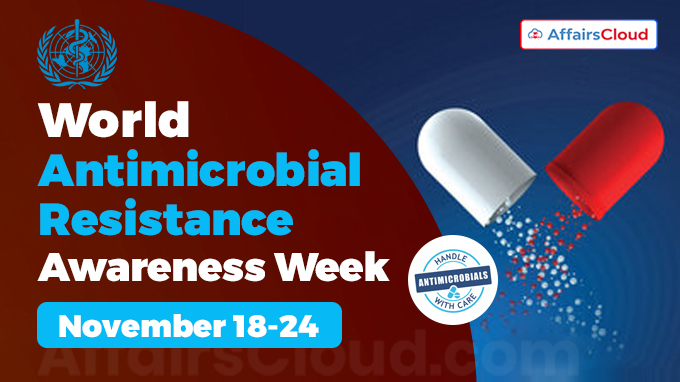 World AMR (Antimicrobial Resistance) Awareness Week (WAAW), previously known as “World Antimicrobial Awareness Week (WAAW), is an annual global campaign celebrated across the globe from November 18 to 24 to raise awareness and understanding of AMR.
World AMR (Antimicrobial Resistance) Awareness Week (WAAW), previously known as “World Antimicrobial Awareness Week (WAAW), is an annual global campaign celebrated across the globe from November 18 to 24 to raise awareness and understanding of AMR.
- The day also promotes best practices among One Health stakeholders to reduce the emergence and spread of drug-resistant infections.
Theme:
The theme for WAAW 2023, observed from 18th to 24th November 2023, is “Preventing Antimicrobial Resistance Together”.
- The theme highlights the need for cross-sectoral collaboration to preserve the effectiveness of antimicrobials.
- The WAAW 2022 was also observed on the same theme.
Background:
In 2015, the 68th World Health Assembly(WHA), the decision-making body of the World Health Organization (WHO), supported a global action plan to address the growing problem of antibiotic and other antimicrobial resistance.
- WHO observed the first World Antibiotic Awareness Week from 16th to 22nd November 2015.
Expanding the scope of the observance:
i.In May 2020, Tripartite Organizations (the Food and Agriculture Organization of the United Nations (FAO), the World Organisation for Animal Health (OIE) and WHO expanded the scope of WAAW changing its focus from “antibiotics” to the more encompassing and inclusive term “antimicrobials“.
ii.The Tripartite Executive Committee has also decided to fix WAAW dates to 18th – 24th November starting from 2020.
- Since 2020, WAAW has been observed as “World Antimicrobial Awareness Week”.
Rebranding as World AMR Awareness Week:
In June 2023, the Quadripartite organizations: FAO, the United Nations Environment Programme (UNEP), WHO, and the World Organisation for Animal Health (WOAH), announced the rebranding of World Antimicrobial Awareness Week as World AMR Awareness Week.
- The acronym will remain “WAAW”, while all expansions of this acronym will now be re-branded as “World AMR Awareness Week.”
What is AMR?
i.Antimicrobial resistance (AMR) is the ability of microorganisms, such as bacteria, viruses, fungi, and parasites, to resist the effects of antimicrobial drugs, such as antibiotics, antivirals, antifungals, and antiparasitics.
ii.This means that the drugs are no longer effective in killing or stopping the growth of the microorganisms, making infections caused by them difficult or impossible to treat.
iii.It is estimated that AMR caused at least 1.27 million deaths worldwide in 2019, and this number is expected to rise to 10 million by 2050.
About World Health Organisation (WHO):
Director General – Tedros Adhanom Ghebreyesus
Headquarters – Geneva, Switzerland
Established in 1948




